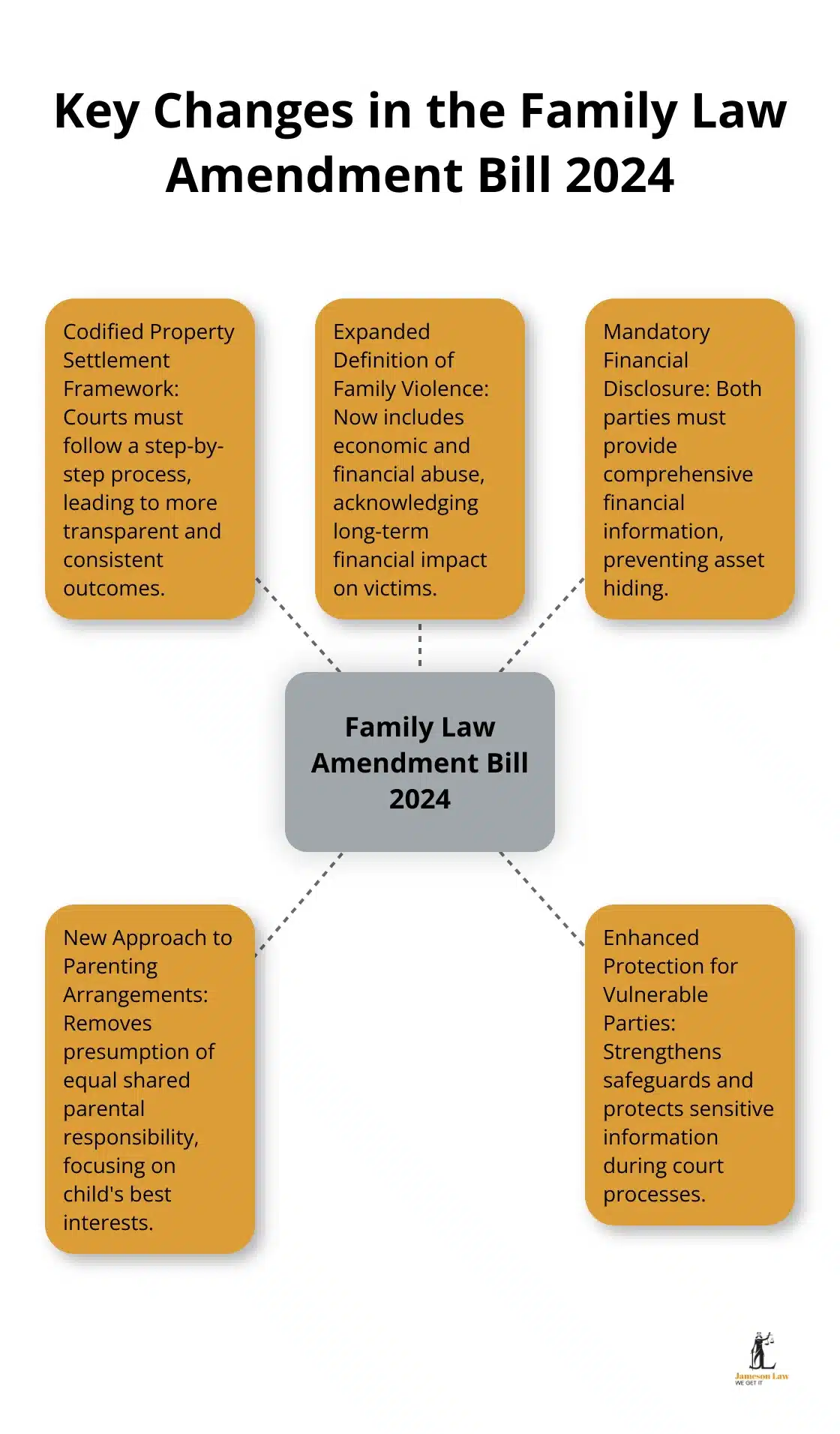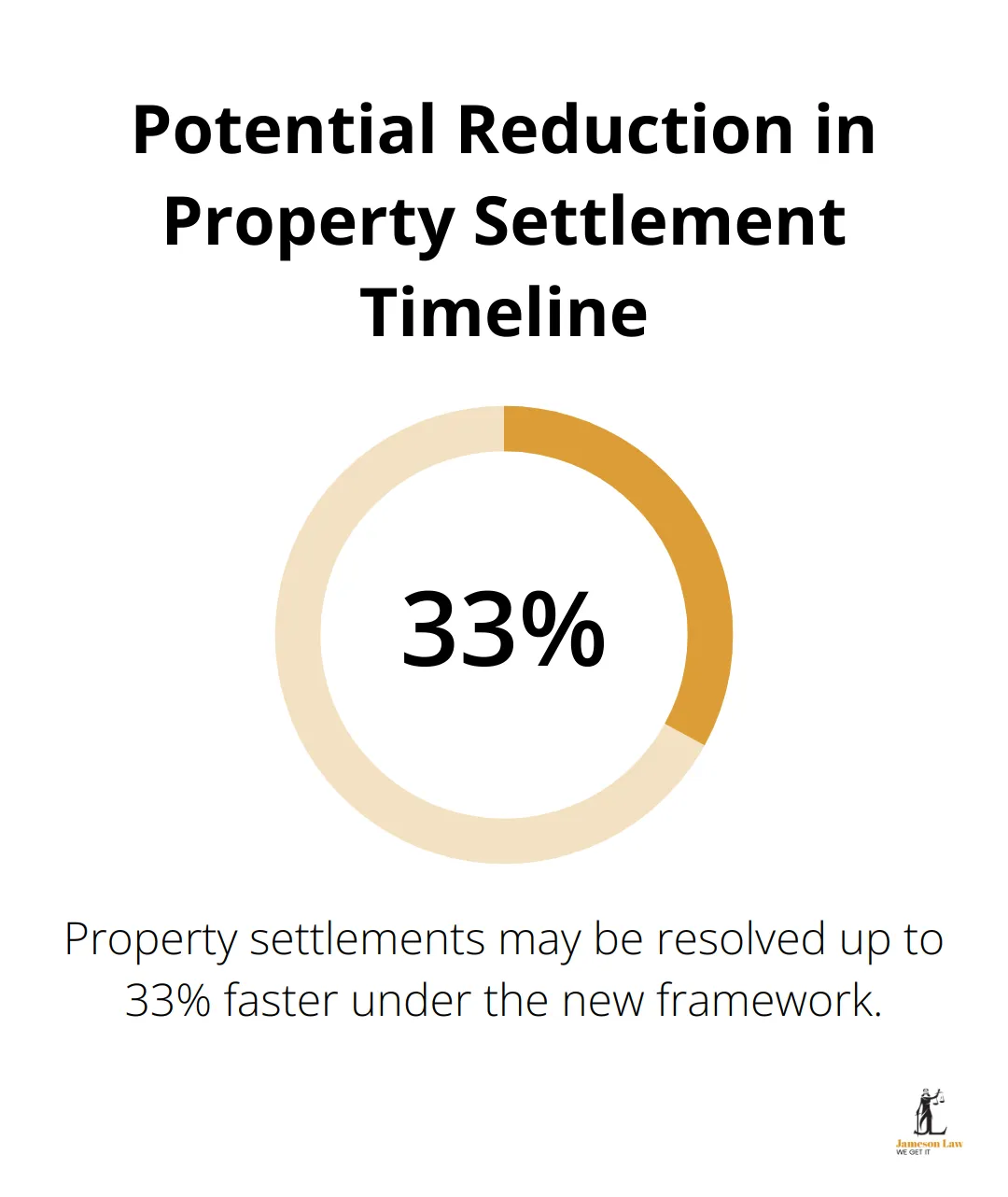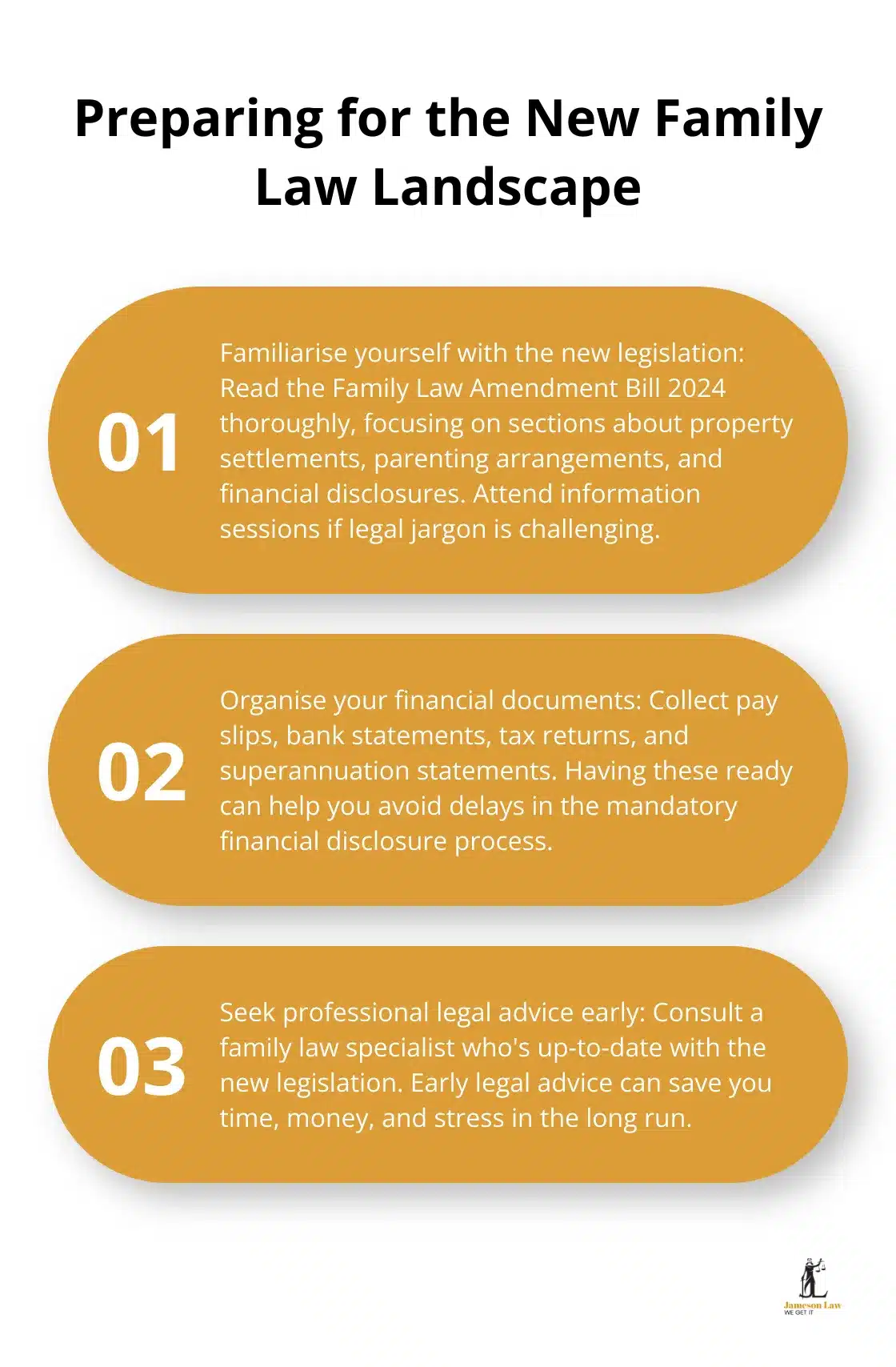The Family Law Amendment Bill 2024 is set to reshape Australia’s legal landscape for families. This groundbreaking legislation introduces significant changes to property settlements, parenting arrangements, and financial disclosures.
At Jameson Law, we understand the profound impact these amendments will have on individuals navigating family law matters. Our team is committed to guiding you through these changes and ensuring you’re well-prepared for the new legal framework.
Key Changes in the Family Law Amendment Bill 2024
The Family Law Amendment Bill 2024 introduces sweeping changes to Australia’s family law system. These amendments aim to streamline processes, protect vulnerable parties, and ensure fairer outcomes for all involved.

Codified Property Settlement Framework
The bill introduces a Codified Property Settlement Framework. This codification will make the process more transparent and consistent. Courts must now follow a step-by-step process when determining property settlements. This change will likely lead to more predictable outcomes (and potentially reduce litigation).
Expanded Definition of Family Violence
Family violence now includes economic and financial abuse. This broader definition acknowledges the long-term financial impact of abuse on victims. Courts will consider how family violence affects a party’s contributions and future needs when making property settlements. This change could result in more equitable outcomes for victims of family violence.
Mandatory Financial Disclosure
The bill introduces a formal duty of financial disclosure. This means both parties must provide comprehensive financial information, including assets, liabilities, and superannuation. Mandatory financial disclosure in Australian family law will be elevated to the Family Law Act 1975 from 10 June 2025. Failure to disclose could result in penalties. This change aims to prevent the hiding of assets and ensure fair property divisions.
New Approach to Parenting Arrangements
The bill removes the presumption of equal shared parental responsibility. Courts will now assess each case individually, focusing on the child’s best interests. This change allows for more flexible and tailored parenting arrangements.
The bill also emphasises the importance of children maintaining cultural connections (particularly for Aboriginal and Torres Strait Islander children). This recognition aligns with recommendations to better support Indigenous families in the family law system.
Enhanced Protection for Vulnerable Parties
The new legislation strengthens safeguards for vulnerable individuals in family law proceedings. It introduces measures to protect sensitive information and prevent its disclosure during court processes. This change aims to shield victims of family violence from further harm and encourage more open participation in legal proceedings.
These changes represent a significant shift in Australia’s family law landscape. They create a fairer, more efficient system that better protects vulnerable parties and prioritises children’s wellbeing. As we move forward, it’s essential to understand how these changes will affect families and individuals navigating the complexities of family law.
How Will the Family Law Amendment Bill 2024 Affect You?
The Family Law Amendment Bill 2024 will transform the landscape for Australian families navigating separation and divorce. These changes aim to create a fairer, more efficient system that puts children first and protects vulnerable parties. The Act amends Parts VIII and VIIIAB to address and better recognise the economic consequences of family violence.
Faster Property Settlements
The new codified property settlement framework will speed up the resolution of property disputes. The Australian Institute of Family Studies reports that property settlements currently take 12-18 months to finalise. The new step-by-step process will likely shorten this timeframe significantly.

For separating couples, this means less time in limbo and potentially lower legal costs. However, it’s important to collect all necessary financial documents early. This includes:
- Bank statements
- Superannuation statements
- Property valuations
Tailored Parenting Arrangements
The removal of the presumption of equal shared parental responsibility marks a big shift in how courts approach parenting arrangements. This change allows the court to consider each family’s unique circumstances and dynamics when determining parental arrangements.
Parents should prepare to show how their proposed arrangements serve their child’s best interests. This might include evidence of:
- The child’s current routines
- Relationships with extended family
- Educational needs
Financial Transparency
The introduction of mandatory financial disclosure will significantly impact property settlements. This requirement ensures that parties involved in family law proceedings provide full, frank and accurate information about their financial circumstances.
For individuals going through separation, it’s critical to maintain detailed financial records. This includes:
- Current assets and liabilities
- Records of contributions made throughout the relationship
Being proactive in gathering this information can save time (and reduce stress) during the legal process.
Protecting Vulnerable Parties
The bill strengthens safeguards for vulnerable individuals in family law proceedings. It introduces measures to protect sensitive information and prevent its disclosure during court processes. This change aims to shield victims of family violence from further harm and encourage more open participation in legal proceedings.
Cultural Considerations
The new legislation emphasises the importance of children maintaining cultural connections (particularly for Aboriginal and Torres Strait Islander children). This recognition aligns with recommendations to better support Indigenous families in the family law system.
As these changes take effect, it’s essential to seek professional legal guidance early in the separation process. An experienced family law team can help you understand your rights and obligations under the new legislation, ensuring you’re well-prepared for the challenges ahead. The next section will explore practical steps you can take to navigate this new legal landscape effectively.
How to Prepare for the New Family Law Landscape
The Family Law Amendment Bill 2024 introduces significant amendments to the Act which relate to property and financial proceedings for de facto and married couples. To navigate this new landscape effectively, you must take proactive steps. Here’s how you can prepare:

Familiarise Yourself with the New Legislation
Read the Family Law Amendment Bill 2024 thoroughly. The Australian Government’s Federal Register of Legislation website provides the full text. Focus on sections about property settlements, parenting arrangements, and financial disclosures. These areas have seen the most substantial changes.
Don’t rely on secondhand information or summaries. The nuances in the legal text can significantly impact your case. If you find the legal jargon challenging, attend information sessions. Many community legal centres and law societies across Australia offer free seminars on new legislation.
Organise Your Financial Documents
The new mandatory financial disclosure rules require you to have your financial house in order. Start collecting these documents immediately:
- Pay slips or income records
- Bank account statements
- Tax returns (personal and business, if applicable)
- Superannuation statements
Having your financial documents ready can help you avoid delays in this process.
Seek Professional Legal Advice Early
Don’t wait until you’re in the thick of legal proceedings to consult a lawyer. Early legal advice can save you time, money, and stress in the long run. Look for a family law specialist who’s up-to-date with the new legislation.
Family law experts can provide tailored advice based on your unique situation. What worked for a friend or family member under the old laws might not apply to you now.
Consider Alternative Dispute Resolution
The new legislation encourages alternative dispute resolution methods. These can be faster and less costly than going to court. Options include:
- Mediation
- Collaborative law
- Arbitration
This approach can be particularly beneficial for parenting arrangements under the new child-focused framework.
Stay Informed About Legal Developments
The implementation of the Family Law Amendment Bill 2024 may lead to new interpretations and precedents. Stay informed about these developments by:
- Following reputable legal news sources
- Attending legal seminars or webinars
- Consulting with your lawyer regularly
This proactive approach will help you adapt to the evolving legal landscape and make informed decisions about your family law matters.
Final Thoughts
The Family Law Amendment Bill 2024 will transform Australia’s family law landscape. This legislation introduces a codified property settlement framework, expands the definition of family violence, mandates financial disclosure, and revises parenting arrangements. These changes will create a fairer and more efficient system for families who navigate separation and divorce.
The new approach emphasizes transparency, equity, and the best interests of children. It will affect how courts resolve property disputes, make parenting decisions, and protect vulnerable parties. The bill also recognises the importance of maintaining cultural connections, particularly for Aboriginal and Torres Strait Islander families.
At Jameson Law, we offer support to guide you through this new legal landscape. Our team of family law experts understands the implications of the Family Law Amendment Bill 2024. We provide tailored legal advice to help you understand your rights and prepare necessary documentation (should you need it).













